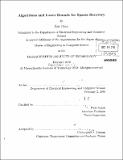Algorithms and lower bounds for sparse recovery
Author(s)
Price, Eric (Eric C.)
DownloadFull printable version (3.117Mb)
Other Contributors
Massachusetts Institute of Technology. Dept. of Electrical Engineering and Computer Science.
Advisor
Piotr Indyk.
Terms of use
Metadata
Show full item recordAbstract
We consider the following k-sparse recovery problem: design a distribution of m x n matrix A, such that for any signal x, given Ax with high probability we can efficiently recover x satisfying IIx - x l, </-Cmink-sparse x' IIx - x'II. It is known that there exist such distributions with m = O(k log(n/k)) rows; in this thesis, we show that this bound is tight. We also introduce the set query algorithm, a primitive useful for solving special cases of sparse recovery using less than 8(k log(n/k)) rows. The set query algorithm estimates the values of a vector x [epsilon] Rn over a support S of size k from a randomized sparse binary linear sketch Ax of size O(k). Given Ax and S, we can recover x' with IIlx' - xSII2 </- [theta]IIx - xsII2 with probability at least 1 - k-[omega](1). The recovery takes O(k) time. While interesting in its own right, this primitive also has a number of applications. For example, we can: * Improve the sparse recovery of Zipfian distributions O(k log n) measurements from a 1 + [epsilon] approximation to a 1 + o(1) approximation, giving the first such approximation when k </- O(n1-[epsilon]). * Recover block-sparse vectors with O(k) space and a 1 + [epsilon] approximation. Previous algorithms required either w(k) space or w(1) approximation.
Description
Thesis (M. Eng.)--Massachusetts Institute of Technology, Dept. of Electrical Engineering and Computer Science, 2010. Cataloged from PDF version of thesis. Includes bibliographical references (p. 69-71).
Date issued
2010Department
Massachusetts Institute of Technology. Department of Electrical Engineering and Computer SciencePublisher
Massachusetts Institute of Technology
Keywords
Electrical Engineering and Computer Science.